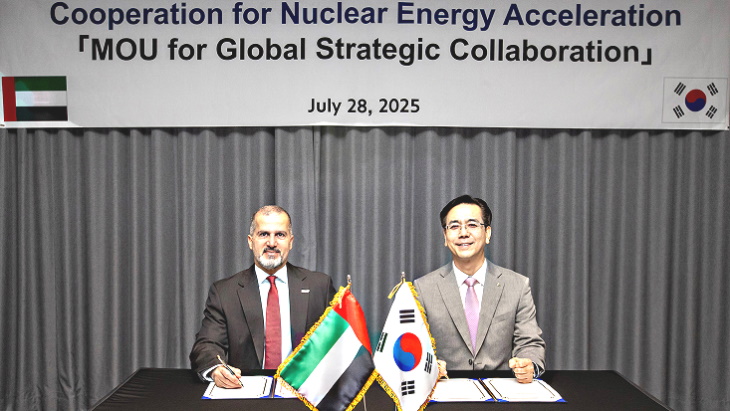In the evolving landscape of global energy, the Emirates Nuclear Energy Corporation (ENEC) is emerging not just as a national energy provider but as a global strategic partner reshaping how countries collaborate on nuclear power. Through a series of high-level agreements signed in 2024 and 2025, ENEC has laid the foundation for a truly international nuclear footprint—anchored by partnerships with South Korea’s KEPCO and Hyundai Engineering & Construction, and the U.S.-based Westinghouse Electric Company.
This marks a pivotal shift: from ENEC as a recipient of international technology to a proactive, globally-oriented player co-developing the future of nuclear energy in emerging markets.

(Image: Hyundai E&C)
ENEC’s flagship project, the Barakah Nuclear Power Plant, developed with Korea Electric Power Corporation (KEPCO) and Hyundai E&C, has not only delivered baseload clean power to the UAE but also validated a replicable model for nuclear deployment in emerging markets. Drawing on this success:
In May 2024, ENEC and KEPCO signed an MoU to jointly develop nuclear projects in third countries, particularly in Asia, Africa, and Eastern Europe. The scope includes large-scale nuclear reactors, small modular reactors (SMRs), and hydrogen production.
By July 2025, ENEC had expanded this cooperation, entering a new strategic MoU with Hyundai E&C. This agreement focuses on site evaluation, investment feasibility studies, and coordinated project delivery, supported by a joint working group to streamline execution.
These agreements signal a clear intention: ENEC is going global, and doing so with trusted partners that share operational experience and a track record of safe nuclear delivery.
In a parallel strategic expansion, ENEC signed a landmark agreement with Westinghouse Electric Company in July 2025. This deal includes:
Exploring deployment of the AP1000 reactor in the U.S., potentially supporting the nation’s ambitious goal to quadruple nuclear capacity by 2050;
Collaborating on nuclear fuel supply chain resilience;
Enhancing cooperation in operations and digital transformation, including AI-driven maintenance and safety protocols.
This partnership not only gives ENEC access to the U.S. market—one of the most competitive and politically influential in the nuclear field—but also positions it as a serious stakeholder in next-generation nuclear development and energy security.
As the U.S. power grid braces for explosive demand growth from AI, data centers, and electrified industry, ENEC’s entry is timely. The agreement responds to this future of energy demand with firm, zero-carbon baseload supply, adding unique value in a market hungry for reliability and scale.
The sequence of these MoUs reflects more than bilateral cooperation—it represents a systemic approach to exporting nuclear development know-how. Unlike past models where technology flowed unidirectionally from OECD countries to emerging economies, ENEC offers:
Project-proven construction and commissioning experience (Barakah);
Operational and regulatory excellence in a high-standard IAEA member country;
Integrated value chain partnerships, connecting Korean EPC strength, American design leadership, and Emirati capital and policy innovation.
This triangulated model can lower entry barriers for countries seeking to adopt nuclear energy but lacking local experience. It presents a streamlined, replicable approach to navigating regulatory, financial, and technical hurdles—especially in regions where decarbonization and energy security agendas converge.
In an era of fragmented geopolitics and energy rivalry, ENEC’s partnerships show that nuclear collaboration remains one of the last frontiers of multilateralism. With partners from Korea, the UAE, and the United States—each with different strategic priorities—the cooperation model focuses on delivery, not dependency.
This collaborative approach sends a clear message: if nuclear is to make a meaningful contribution to the global clean energy transition, no single country can act alone. Partnerships, particularly those bridging finance, technology, and execution, will be key to unlocking the full potential of nuclear power in the 21st century.
What began as the Middle East’s first nuclear power plant is fast becoming a template for global nuclear deployment. ENEC’s transformation into an international player—via strategic deals with KEPCO, Hyundai, and Westinghouse—underscores a broader truth: success in nuclear energy is not just about technology or policy, but about trust, replication, and joint execution.
As more emerging markets consider nuclear energy as part of their net-zero strategies, ENEC stands ready—not as a vendor or consultant, but as a partner in full.